Advertisement
From ‘Grand Theft Auto V’ To ‘Gone Home’ — 7 Must-Play Video Games From 2013
These seven games helped define the art, business, and fun of video games in 2013. They are important, unmissable, and very safe to gift for the holiday.
"BioShock Infinite"
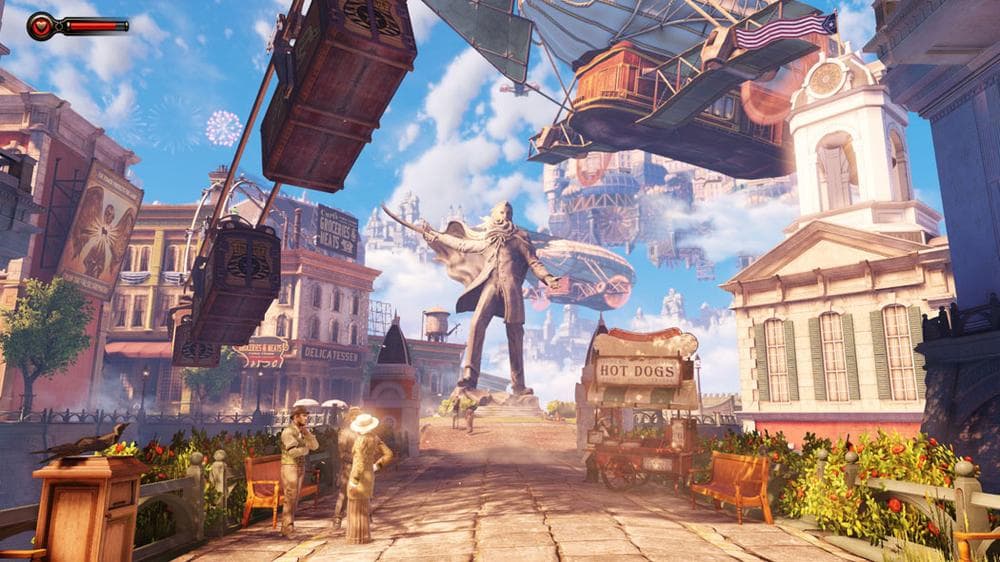
“BioShock Infinite,” developed by Irrational Games in Quincy, Massachusetts, is a game about environment, philosophical questions, and shooting things, in that order. “Infinite” takes place in a floating city in the sky named Columbia in an alternate reality 1912. It concerns itself with religious fanaticism, runaway nationalism, and conflicts of race and class as investigated largely by confronting the fanatical nationalists trying to kill the hero and recapture the woman he was sent to Columbia to rescue.
“BioShock Infinite” is a treatise on imaginative game environments and a statement about the sorts of ideas video games are capable of investigating, even when they are hewn from the most traditional sorts of game designs, i.e. running around and shooting things. And, on that latter note, “BioShock Infinite” is a way to keep in touch with one of the most enduring and popular genres of video games in the industry, the first-person shooter.
“BioShock Infinite” also has a mind-blowing ending that will probably stick with you for a very long time, if not forever.
"Grand Theft Auto V"
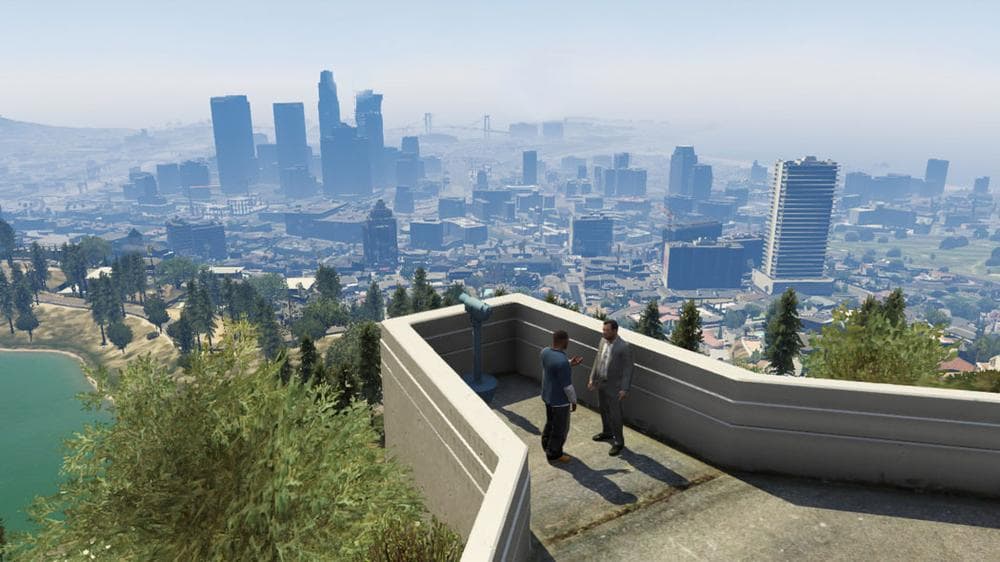
“Grand Theft Auto” is one of the few video game franchises that is irrefutably relevant to American culture outside video game enthusiast circles. “Grand Theft Auto V"’s biting, no holds barred satire of American culture is blunt and on the nose, but also perceptive and apt. There is a depth and spirit to “GTA V” which may, unfortunately, be covered up by surface level looks at the game and its violence. And this is not a game for children.
The city of Los Santos is modeled after Los Angeles, and some of the locations are stunningly accurate compared to their real life counterparts. The rest of the sprawling game world, the state of San Andreas, is modeled after the state of California, complete with pine wood forests, deserts, vineyards, and picturesque sea coasts. “Grand Theft Auto V” is a technical marvel for its size and detail.
The “Grand Theft Auto” series is the crème de la crème of the “open world” genre, video games that provide the player with a virtual playground of places to go, things to see, and activities to engage in. While there is a story in “GTA V,” players are free to ignore it if they want and play tennis or golf, get some tattoos, go shopping, or race cars, just to note a few activities. And the “Grand Theft Auto Online” portion of the game grants the player even more freedom to do what they want, when they want, and with their friends rather than doing so alone.
“Grand Theft Auto V” represents the blockbuster or “triple-A” video game industry at its best. It is already winning Game of the Year awards, and deservedly so.
"The Last of Us"
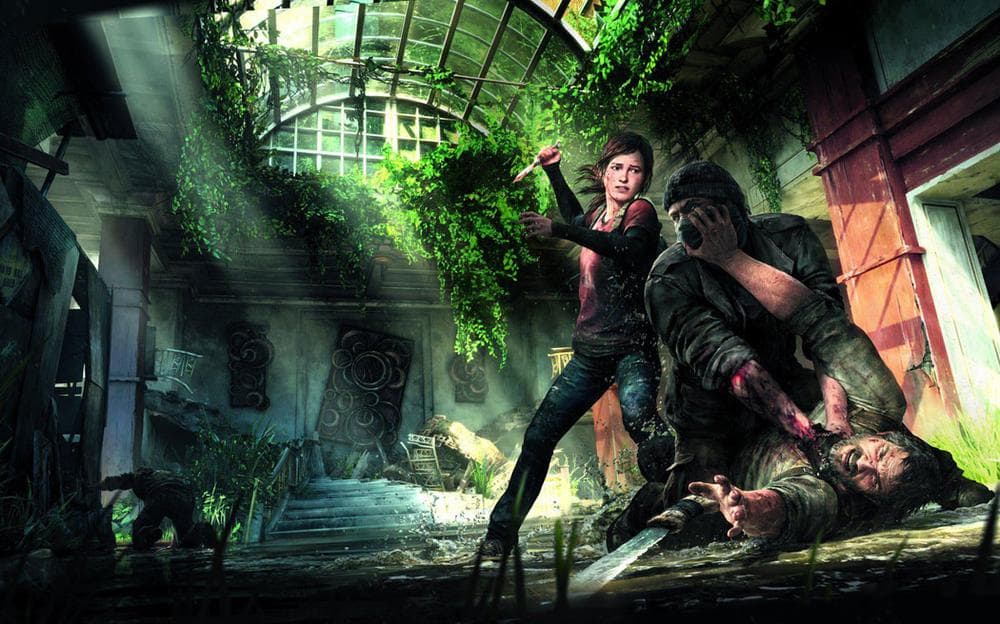
Naughty Dog, the game development studio based in Santa Monica, California, has an established pedigree as a studio that cares about story and employing cinematic language in their games, which are exclusive to Sony’s PlayStation 3 console. Naughty Dog’s “Uncharted series”—think Indiana Jones in the modern day—has developed what are considered some of the best games released for the PlayStation 3 over the past seven years.
“The Last of Us” (pictured above and at top) is a post-apocalyptic tale set in a world where a mutated form of fungus has turned most of humanity into zombie-like creatures, and the few human survivors live in government enclaves under totalitarian authority. Smugglers try to bring vestiges of the old world into these communities, and outside the gates—think Cormac McCarthy’s “The Road,” with renegades and cannibals and everything else you’d expect to find at the end of the world.
“The Last of Us” blends stealth and moments of abject terror, sticking to the shadows and moving quietly through decrepit, decaying buildings while praying not to alert mutated zombies to your presence, with brutal combat. “The Last of Us” doesn’t pull punches, least of all dramatically.
The story is about a smuggler who lost his daughter 20 years ago during the panic and harsh military response to the initial outbreak, who escorts a young girl named Ellie from Boston to the Midwest. I won’t the spoil the game with why their journey is necessary, but it’s a harsh story about survival and sacrifice that may feel traumatic but is worth every moment.
"Papers, Please"
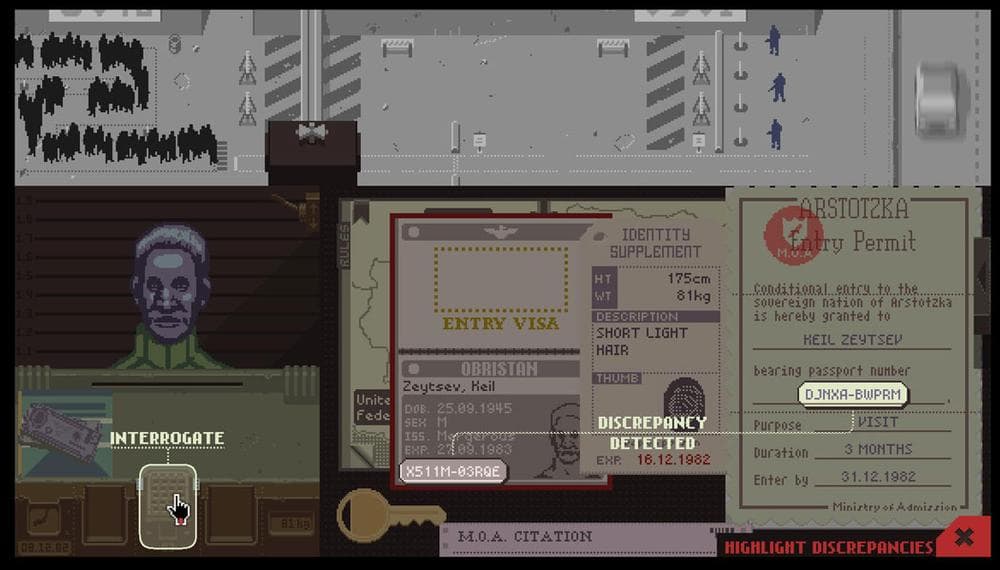
“Papers, Please” was developed by one man, Lucas Pope, and is a sterling example of the creativity that is blooming in the so-called “indie” video game industry. And it’s one of the many arguments that high-end graphics, orchestral soundtracks, and Hollywood-quality voice acting are not necessary to create the video games that define what the medium is capable of.
You are a border guard for the Eastern Bloc nation of Arstozka. Your salary supports your wife, son, mother-in-law and uncle, who need heat, food, and medicine in order to stay alive. Your job is to admit approved visitors to Arstozka, and your salary depends on how many people you successfully process at the border.
You have a rulebook to reference the guidelines for admission, which become increasingly complex as the game progresses, and determine what information needs to be on which documents. The amount of paper you need to sift through for each applicant also increases as the guidelines for admission become more difficult to handle, and mistakes become far too easy to make.
I never would have thought that a game about processing paperwork would be so enthralling, but “Papers, Please” has chilling subtext beneath its puzzles. The first time I used a scanner to search someone for contraband and found myself staring at a nude picture, I realized that was precisely the kind of image some TSA employee sees whenever I pass through the security checkpoint on the way to board an airplane.
If you mistakenly admit or turn away people from the border, after a few warnings you are fined, and when four people at home are depending on you to provide the money to keep them alive, you might need to make some hard decisions as to who lives and who dies if you cannot afford to take care of them all. It’s a similar decision, spiritually, to the elderly American who has to choose between their prescription drugs and eating.
“Papers, Please” has something important to say not only about life in the old Soviet Eastern Bloc, but about the world we’re living in, right now, and what we’re forced to deal with in order to live.
"Ridiculous Fishing"
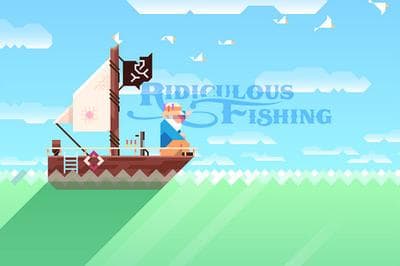
"Ridiculous Fishing - A Tale Of Redemption" was recently named iOS game of the year by Apple, and considering the deluge of video games which hit the App Store every year this, in and of itself, is enough reason to recommend the game to you.
In "Ridiculous Fishing," you cast your line into the ocean and attempt to get your hook as deep into the water as you can, by moving it left or right and avoiding any fish. Once your hook either touches a fish or reaches its maximum depth you'll reel the hook in, and have to swing your hook into as many fish as you can on the way back up to the surface. All the fish you catch are then thrown high into the air, and you shoot the fish down with guns. You earn money for the fish you shoot, and can purchase upgrades like bigger and better guns, hooks that can be cast deeper into the water, or maps to unlock new seas to fish in.
"Ridiculous Fishing" exemplifies the space that mobile video games are uniquely suited to fill. Casting your line and pulverizing your catch with bullets takes maybe 60 seconds, longer once you have a hook that can go really deep and you become skilled at getting it all the way to the bottom of your hook's potential depth without touching any fish. And imagine all the spaces in a given day you could fill with a quick round of "Ridiculous Fishing”—on hold during a phone call, standing in line behind someone at the store, waiting to pick someone up at the airport.
"Ridiculous Fishing" is also representative of the preposterous shopping one can do for mobile games. Apple's iOS game of the year will only cost you $2.99. Compare that to the traditional $59.99 price tag for new video games on traditional game consoles. It's not an apples to apples comparison, as traditional video games are much larger in scope and try to provide an appropriate spectacle, but I have yet to hear or read a serious video game critic argue that "Ridiculous Fishing" is any less of a satisfying game experience for its simplicity. And this is why mobile games, as a whole, are considered one of the most disruptive forces faced by the traditional video game industry today.
"Gone Home"
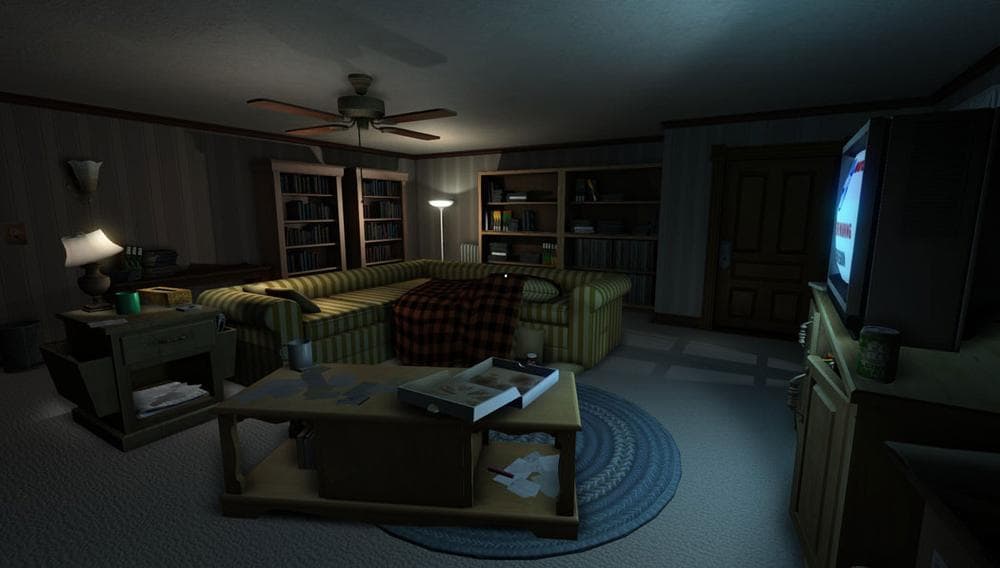
“Gone Home” is part of a growing set of video game experiences that take place through first-person perspectives, but which have more in common with fiction than with any genre of video game you might be familiar with. “Gone Home” also represents a video game industry gone full circle. It feels like a return to the interactive stories like “Zork” which were popular when the video game industry was still in its infancy in the 1970s.
“Gone Home” takes place in the Greenbriar family’s two-story mansion on the evening of June 7, 1995. The player is Kaitlin Greenbriar, returning home from a European trip, and she’s unfamiliar with the empty house she enters because her family moved in while she was away. While Kaitlin explores the house, going through the papers in desks, finding manila folders on bookshelves, or opening dresser drawers, for example, Kaitlin finds letters and notes that paint the picture of what her family has been up to. She also unlocks letters from her sister Samantha, which are read aloud when Kaitlin investigates certain rooms.
“Gone Home” is an example of the way video games can create compelling, virtual spaces. Where a house in a game might normally offer very limited interaction, like doors or a specific, limited number of containers to open, the Greenbriar home is dense with everyday locations to explore. As I lost myself in the exploration of the home, I found myself putting objects back where I found them, closing doors and desk drawers, or turning off lights behind as I left a room, without thinking about it, because the space felt so familiar and real and I like things to be tidy.
“Gone Home” is also a game that begs the increasingly relevant question of what defines a video game in the first place. It has no puzzles. There are no victory conditions, and no fail states. There are no cut scenes. It is a story about flirtation with marital infidelity, the frustration of being a writer, and the burgeoning sexuality of a teenager, which might have been told as well in prose as through the technology of a video game. The story probably would have more immediacy for most people when presented in the first person, however. “Gone Home” augurs a day when many storytellers, not just a few game developers on the cutting edge, may consider virtual spaces as just another, potential canvas for their stories.
"Card Hunter"
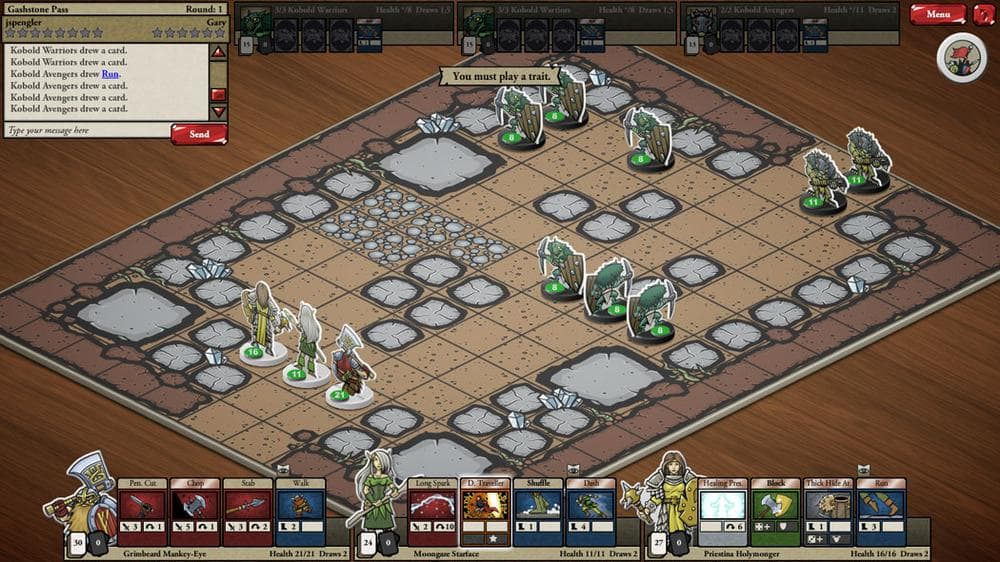
Browser games literally run right in your web browser. Free to play games require no purchases. They are both video game genres that often suggest a lack of quality, or nickel-and-dime monetization schemes, to video game players who mostly play traditional games. “Card Hunter” not only belies both of those assumptions, but is one of the most holistically well-crafted video games I’ve seen in years.
“Card Hunter” mixes elements from collectible card games like “Magic: The Gathering,” tabletop miniatures games like “Warhammer Fantasy Battles,” traditional board games with dice and plastic pieces, and role playing games like “Dungeons and Dragons.” The fashion in which “Card Hunter” blends all of these elements together into one seamless, easy-to-learn experience is a demonstration of masterful game design.
The essence of “Card Hunter” is a fantasy adventure for which the player builds a party of wizards, warriors, dwarves, elves, and/or other fantasy archetypes. Each adventure is composed of several encounters which take place on game boards. The player’s adventurers are playing pieces on the board, and actions like movement and combat are committed by playing cards from the player’s card deck, which is built according to the weapons and armor the characters are wearing.
It sounds odd, but the high quality of the art and music alone are a reason to check this game out, and it costs you absolutely nothing to do so. The completely free game experience is robust. “Card Hunter” exemplifies the right way to design a free to play game, which is to make the base experience so good that it engenders the player to spend money not because they have to, but because they want to.
“Card Hunter” is also important because it begs another central question to current conversations in video game criticism, namely trying to determine what we mean by an “indie” game. “Card Hunter” was developed by a small team, a hallmark of indie game development, but it was founded by Jon Chey, who was one of the founders of Irrational Games, the studio that developed the BioShock series. The “Card Hunter” team is composed of industry veterans, whereas the appellation “indie” often conjures images of fresh faces still trying to prove themselves.
“Card Hunter” is a perfect demonstration of how the status quo of the Triple-A video game development industry, both in terms of the types of games being developed, and the business models which are proving successful, and the current understanding of the dividing line between indie and mainstream video games, are being challenged today.
Dennis Scimeca is a Boston-based freelance writer. He is usually on the video game beat, and has been published on Salon, Polygon, Ars Technica, and Kotaku. Follow him on Twitter: @DennisScimeca.
More
This program aired on December 23, 2013. The audio for this program is not available.